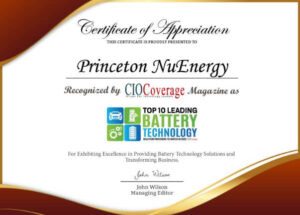Princeton NuEnergy – Innovative Li-Ion Battery Recycling & Battery Materials Production

Princeton NuEnergy (PNE) is an innovative clean-tech startup company spun out from Princeton University in 2019. It focuses on the direct recycling of lithium-ion batteries (LIBs) from electric vehicles (EVs) and consumer electronics. Since its inception to merely promote and distribute LIBs, it has successfully positioned itself as innovative and one-of-a-kind by delivering a cost-efficient, environmentally friendly lithium-ion battery recycling solution, solving the current industry pain point of high-operational cost battery recycling, and improving battery recycling efficiency and purity.
PNE has been working relentlessly to specialize and develop rechargeable technology. It takes pride in developing strong associations with top battery manufacturers to bring the best to its customers. PNE is distinguished for its amicable and nuanced approach to ensuring customer satisfaction. So much so that it becomes a worthwhile experience to explore its quality management system.
Grant funding from the U.S. Department of Energy, and a new partnership with the Fortune Global 500 company Wistron Corp. on a Lithium-Ion Battery and Kickoff Pilot Project, PNE has been a growing not just as a sustainable business platform but also as a pioneering research-assisted team that is premiering a novel multistep battery-recycling approach.
Dr. Chao Yan, Founder of PNE, announced, “We are beyond excited to have the support of our investors trusting our idea and backing our mission to revolutionize the lithium-ion battery recycling industry. The capital, knowledge, and network our investors bring to PNE will enable a full-scale development of the company and accelerate our production line development.”
Their partnership with Greenland Technologies Holding Corporation aims to develop sustainable battery solutions for the electric vehicle industry through recyclable batteries. They partnered with Wistron GreenTech and eTak Worldwide to recycle and repurpose old LIBs to decrease carbon dioxide emissions and increase operational efficiency. They developed trademarked and cost- and energy-efficient solutions (Cathode-to-Cathode™ and Anode-to-Anode™) for their collaboration with Cenntro to recycle cathode materials.
After the battery components are disassembled with the help of water-based solutions, the positive and negative electrode materials are separated. Furthermore, to filter and separate intact and damaged particles, additional steps are employed.

A plasma maintained at a low temperature is exposed to the positive electrode material along with a gas containing charged molecules and electrons. The consequential reactions that follow after this step allow the flushing out of contaminants without the use of acids.
The concluding step circles around recovery. Battery materials need to be of a particular shape and crystalline structure in the form of new electrodes that can be ultimately installed inside the battery to be reusable.
Did you know that the battery recycling market is expected to reach over $43 billion? This translates into PNE’s long-term goal to leverage the global EV and LIB market trends. PNE’s technology brings new opportunities to recycle batteries with high energy efficiency, cost-effectiveness, and low environmental impact, thus accelerating the electrification of transportation and large-scale energy storage for renewable energy shortly.
Current statistics show disturbing data that will give the readers the heebie-jeebies. In the U.S., only about 5% of lithium-ion batteries are currently recycled. PNE is an avant-garde company because it uses a research-facilitated novel plasma-based purification technology that enables the production of anodes and cathodes that make up the batteries. What is so significant in this process? They accomplish this without breaking the battery materials down into their raw elements like other current processes—like those in hydrometallurgy—do.
Undertaking uninterrupted research methodologies all the while expanding their production line, Princeton NuEnergy is setting new bars to scale up to. Their work process is transformative because it protects the environment without compromising human health.



